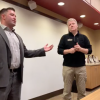The El Paso County Board of County Commissioners unanimously voted to deny a $20,750 Community Development Block Grant to The PLACE, a nonprofit that helps youth exit homelessness, over concerns related to abortion and parents’ rights during a July 11 meeting.
“The Board of County Commissioners holds decision-making authority for this type of funding,” said Shawna Kemppainen, executive director of The PLACE, in an emailed statement. “We accept the commissioners’ decision, and we invite them to learn more about The PLACE’s vital work with young people ages 15 through 24 who are experiencing or at risk of homelessness. The PLACE is a known and trusted organization in the Pikes Peak region, and our work continues to reach 600 youth and young adults annually.”
The PLACE was initially listed as one of 17 grant recipients presented to the Board of County Commissioners by Crystal LaTier, the executive director of economic development for El Paso County. The other 16 nonprofits were funded, and the $20,750 intended for The Place was distributed amongst them.
District 4 Commissioner Longinos Gonzalez initially raised concerns about pro-abortion statements allegedly made during a fundraiser last year. “I went to their little fundraiser breakfast, Under the Bridge, last year,” he said. “One of their members, so this is not to say it was the entire board or the entity at all, but I believe it was the chairperson, last year made some statements that were, I think, divisive, controversial. I don’t know why somebody would want to bring controversy when I think, as a whole, the program is very good. I just want to make sure some of the funds will not be going — some of the statements had to do with, again not trying to delve into controversial aspects, but pro-abortion comments that were out of place for the fundraiser. I want to make sure funds that are provided by the county would not be supporting any kind of counseling services, et cetera, as related to abortion.”
District 2 Commissioner Carrie Geitner raised concerns about child trafficking. “Runaways are a huge place where trafficking happens,” she said. “That is a well-documented concern that those kids can be preyed upon. Unfortunately, organizations are not immune to that. There are circumstances, and again I can’t speak to what is happening there, so this is more of a preemptive, ‘I’d love to make sure those things aren’t happening there.’ Unfortunately, whether it is drug treatment facilities, or jails, or anywhere else, we know people will prey on organizations and on people in these situations, so I’m really concerned about how we are making sure that if those kids are being served, it’s being done safely. How do we make sure they’re contacting DHS? What kind of controls do we have on this situation? Also, because the laws in Colorado are, quite frankly, egregious, in that parents have very little ability to understand what is going on with their minors. For example, if a 15 year-old shows up to a runaway shelter, what is this organization prepared to in terms of trying to get in touch with parents, trying to respect those kinds of parental rights, because in the state of Colorado they could get medical treatment, including an abortion. They could be counseled to do that and get that without ever notifying a parent, and onward and onward. There’s all kinds of potential medical interventions, mental health interventions, which again could be very good and could be very detrimental depending on who is delivering those. I’m really interested in safeguards that we have on those programs, to make sure that those things are not happening.”
Colorado already has safeguards in place for organizations like The PLACE. “Youth shelters that are licensed by the State of Colorado, such as The PLACE, must have background checks [for staff and volunteers], relevant training, and mandatory reporter status,” said Kemppainen.

Geitner also questioned whether youth can even be homeless. “Minors cannot be homeless,” she claimed. “They are either living with their parents or they get DHS involved. That’s a specific government responsibility because we have a lot more oversights in that situation. I would say there is a mechanism in place, and that is that we have social workers who are highly trained in this that have to follow a whole lot of other rules and steps, so I’m not even sure I would agree that it — for those minors in particular, maybe those over 18 — I’m not even certain I would agree that, because the government does not allow minors to be homeless. There are steps and provisions in place for that.”
Homelessness disproportionately affects LGBTQ youth. According to the Trevor Project’s 2021 National Survey on LGBTQ Youth Mental Health, 28% of LGBTQ youth reported experiencing homelessness or housing instability at some point in their lives, and 16% of LGBTQ youth reported that they had slept away from parents or caregivers because they ran away from home, with more than half (55%) reporting that they ran away from home because of mistreatment or fear of mistreatment due to their LGBTQ identity.
According to Kemppainen, The PLACE served 638 youth in 2022, of those approximately 26% identified LGBTQ, and half were Black, indigenous, or people of color.
Geitner’s husband, former Republican Rep. Tim Geitner, spoke at a June 27 Monument Academy board meeting in support of their new transgender resolution which vowed to “never promote gender confusion or gender dysphoria in students.”
Other members of the El Paso County Board of County Commissioner’s blamed the Democrat-controlled legislature for the decision to deny $20,750 to the nonprofit.
“I consider it unfortunate that the state has enacted laws that allow minors to make decisions for themselves,” said District 3 Commissioner Stan VanderWerf, who last year appeared alongside anti-LGBTQ Christian musician Sean Feucht at The Road Church in Colorado Springs, and then marked himself safe from the November 2022 Club Q shooting, where five people were killed at an LGBTQ nightclub in Colorado Springs.
“Today’s actions were precipitated by feeling uncomfortable in our ability to really set parameters and guardrails that are in line with what we’ve done a tremendous amount of thinking about — how do we protect those most vulnerable in our community?” said District 5 Commissioner Cami Bremer, who, along with her husband, failed U.S. Senate candidate Eli Bremer, hosted a “Red Wave Party” in August 2022 to launch Nine PAC, a political group dedicated to preventing transgender people from participating in sports. “I would say that while we didn’t feel comfortable in our ability to do it through this program, through this particular funding, however we do have within our purview of control is ensuring that our Department of Human Services can fill that gap and can fill that need, and that is within our purview right now.”
District 1 Commissioner Holly Williams shared thoughts on other organizations that could benefit from Community Development Block Grants. “My frustration does lie with the State legislature, taking parents out of the equation,” she said. “I would like to see someone like the Life Network [which operates three anti-abortion crisis pregnancy centers in Colorado Springs] apply for this. I will not support the counseling for abortion in minors.”
During a June 2022 candidate forum, Williams said she did support making El Paso County a home rule county, which would allow it to become a so-called “sanctuary county for the unborn.” Attempts to establish such policies in Park and Weld Counties have been unsuccessful.
“I think this place does provide some good services,” said VanderWerf, “but I see how we could get into a situation that could be a challenge.”




